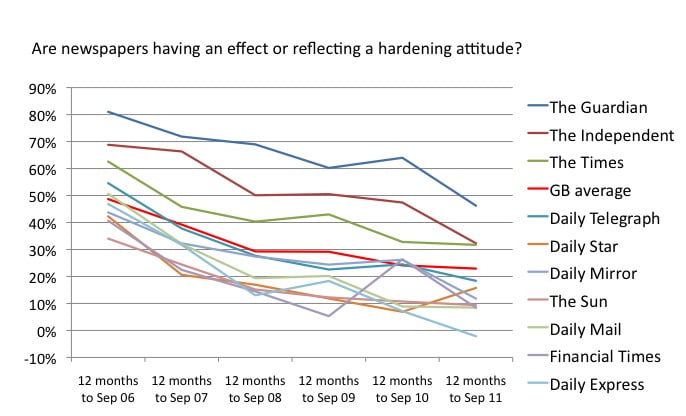

Features
Slaying a new dragon: environmental ennui
Is there too much concern about our blue and green planet? Simon Leadbetter and Rich Whitworth dig into the data.
St. George’s Day is (somewhat) celebrated on April 23 in England. We pay homage to dragon-slaying Roman soldier George who died on this day in 303, and offer ourselves the opportunity for a reserved amount of national pride.
April 22 was Earth Day 2012, when one billion souls, with a single united voice, called for the universal protection of our fragile earth.
Considering both of these themes, we wanted to investigate current green thinking in Britain (sorry Wales and Scotland, you can’t escape so easily; though we admit you are doing better from a renewable energy commitment perspective) by using statistics from Kantar Media and a single negative statement: “There is too much concern with the environment”.
Only weeks ago, we were offered an unsustainable budget at the hands of another, perhaps less popular, George. And despite the upcoming United Nations Conference on Sustainable Development (aka Rio+20) and worldwide admission that climate change is already encroaching on quality of life for many, the continuing economic crisis and concerns over wealth and growth are clearly overshadowing global problems.
Politicians will no doubt thrust themselves into the debate and wrangle for solutions at a higher level come Rio+20, but what do the Great British public think? Dredging through some six-year’s worth of data, we discovered a slightly disappointing trend.
The statistics are based on interviews with 25,000 people over 15 that are weighted to be representative of the British population as a whole. The data set runs from September to September and begins with the 12 months prior to Sep 2006.
Falling concern
 While the majority still disagrees with the statement “There is too much concern with the environment”, there is a noticeable drift in how much we care or believe we should care.
While the majority still disagrees with the statement “There is too much concern with the environment”, there is a noticeable drift in how much we care or believe we should care.
The biggest drop in those disagreeing occurred in the 48 months of the economic crisis Oct 2006–Sep 2008 (for context, Northern Rock was Sep 2007, Lehman Brothers was Sep 2008)—an absolute drop of 11%. Meanwhile, the biggest increase for those in agreement was in the 24 months prior to Sep 2008—an absolute rise of 8%.
Over the six year period, there is rising agreement that “there is too much concern with the environment”—from 14% to 21%. Thankfully, this is still outweighed, albeit by a falling number, by those who disagree—which decreased from 62% to 43%.
No doubt there is a degree of “charity begins at home” syndrome extending out into wider opinion, more than likely caused by the financial strain of the last half-decade or so. But we wanted to find out more.
The breakdown
 Breaking the data down by demographics helped answer some questions about the trend. In the 12 months leading up to September 2011, those who had the largest minorities of those who agreed with the statement—over 20%—were male, those under 25 and over 65, and those earning less than the average family wage of £40,000.
Breaking the data down by demographics helped answer some questions about the trend. In the 12 months leading up to September 2011, those who had the largest minorities of those who agreed with the statement—over 20%—were male, those under 25 and over 65, and those earning less than the average family wage of £40,000.
On the other hand, those who had the largest majorities who disagreed with the statement were women, those with children, those with above average family incomes and aged 25-54.
It is not surprising that those with children are more future facing—agonizing over the fate of our children brings many issues into sharp focus. What is surprising though is the lack of concern from the under 25s. That said, it does in part echo a study by The Carbon Trust that highlighted the apparent apathy (or skepticism) of youth in the USA and UK compared with China and Brazil.
future facing—agonizing over the fate of our children brings many issues into sharp focus. What is surprising though is the lack of concern from the under 25s. That said, it does in part echo a study by The Carbon Trust that highlighted the apparent apathy (or skepticism) of youth in the USA and UK compared with China and Brazil.
Regionally, the South West and South East are most concerned—rising tides? While those of the North East, Wales and the West Midlands showed skepticism. Londoners also appear to be cynical, but that is likely to be the magnifying effect of living in a capital city, where it can very often feel like there is too much concern about everything.
The headlines
We could not resist digging a little deeper and discovering what correlations existed between the general trend and newspaper reporting; most people tend to read newspapers that reflect their own opinions.

We’ll leave the sweeping statements to you, but…
The Daily Express is the only newspaper whose readers agree more than disagree that there is too much with the environment. Enough said.
The Financial Times, Daily Mail and The Sun all suffer a 10% margin (a simple calculation of those that disagree with statement minus those that agree) and the Daily Mirror, Daily Star and Daily Telegraph slide under a 20% margin, meaning that all of the above fall below the British average.
The Times and Independent come in at a 32% margin but remain above the national average.
Interestingly, The Guardian has suffered a dramatic fall in margin from over 80% margin to just under 50% in only six years. The Guardian has a tremendous history of environmental reporting, so perhaps this drop is a blinkered “see no evil” reaction caused by over exposure to the real issues of the world.
Of the ten national titles we analysed, seven have readerships the fall below the national average in terms of concern over the environment. In 2007, there were only five titles in the same position.
Reality bites
Irrespective of public opinion, the global issues we faced six years ago are the same ones we face today. Indeed, a rapidly growing population and a manufacturing revolution in India and China—fuelled by the outsourcing of Western carbon emissions to less regulated nations—are compounding the problem.
One thing is certain: there is not too much concern about the welfare of our planet and its people. Quite the opposite. Burying our heads in the sand—especially tar sands or the sands of Iraq and Saudi Arabia—is not the solution, but may be good practice as climate change continues to increase the world’s deserts and increase water scarcity.
It is time to slay the dragon of skepticism, build national pride and enthusiasm for an emerging sustainable industrial revolution, embrace cleantech innovation, and reconstruct concern over our small blue and green planet for our generation and the next. Our economic woes are fleeting but the state of our environment is forever.
To quote Earth Day network: “The Earth won’t wait”.
Further reading:
OECD warning shot rips through business-as-usual brigade
Mobilising an entire planet for Earth Day 2012
































